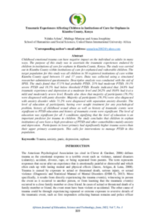The purpose of this study was to ascertain the traumatic experiences endured by children in institutional care in Kiambu County, Kenya. The target population for this study was all children in 50 registered institutions of care within Kiambu County aged between 11 and 17 years. Data was collected using a structured researcher-administered questionnaire. Descriptive analysis was conducted with the aid of SPSS.
The study found that 37.5% had probable PTSD, 21% had moderate PTSD, 19.1% severe PTSD and 18.5% had below threshold PTSD. Results indicated that 24.8% had traumatic experience and depression at a moderate level and 24.2% and 16.6% had it at a mild and moderately severe level. Results also show that majority of participants (76.3%) were diagnosed with panic disorder. Majority of participants (76.3%) were also diagnosed with anxiety disorder while 71.2% were diagnosed with separation anxiety disorder. The level of education of participants, having ever sought treatment for any psychological problem, history of childhood sexual abuse as well as history of traumatic events were significant to PTSD education and history of traumatic events were significant.
The level of education was significant for all 3 conditions signifying that the level of education is an important predictor for trauma in children. The study concludes that children in orphan institutions of care have a high prevalence of PTSD and other co-morbidities mainly anxiety and depression.
Participants in lower primary had significantly higher trauma scores than their upper primary counterparts. This calls for interventions to manage PTSD in this population.

